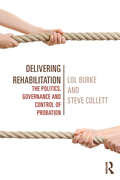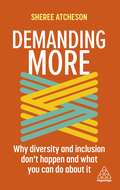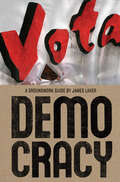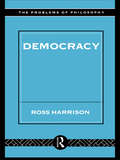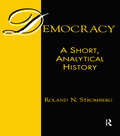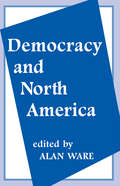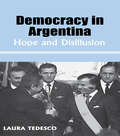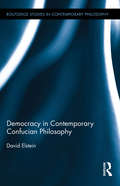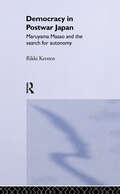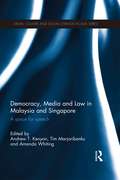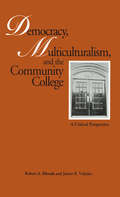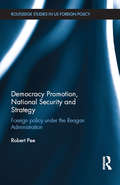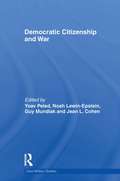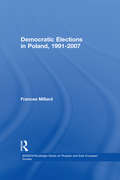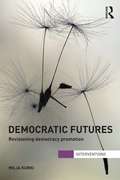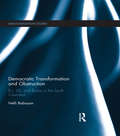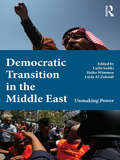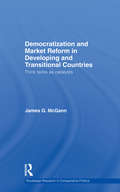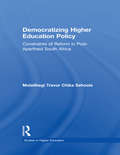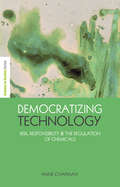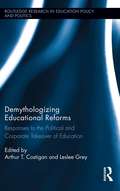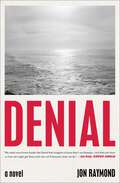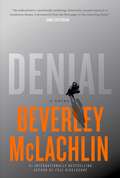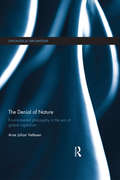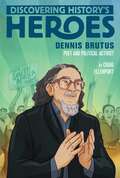Special Collections
Benetech’s Global Certified Accessible Titles
Description: Benetech’s GCA program is the first independent third-party EPUB certification to verify ebook accessibility. By creating content that is born accessible, publishers can meet the needs of all readers. Learn more: https://bornaccessible.benetech.org/
- Table View
- List View
Delivering Rehabilitation
by Lol Burke and Steve CollettDo offenders have the right to be rehabilitated and should the state be responsible for their rehabilitation? Should the public expect punitive and coercive approaches to offender rehabilitation? Why should the state be interested in the reform of individuals and how can helping offenders be justified when there are other disadvantaged groups in society who are unable to access the services they desperately need? Finally, why does the state appear to target and criminalise certain groups and individuals and not others? These are just some of the questions asked in this new text, which offers an analysis of the delivery of rehabilitative services to offenders over the past two decades. It focuses particularly on the ideological and political imperatives of a neoliberal state that intends to segment the work of the Probation Service and hand over the majority of its work to the private sector. Issues covered include: governance, politics and performance of probation, occupational culture and professional identity, markets, profit and delivery, partnership, localism and civil society, citizenship, exclusion and the State. This book is aimed at academics, practitioners, managers and leaders within the field of corrections and wider social policy. It will also appeal to undergraduates and postgraduates specialising in criminal justice, criminology, politics and social policy.
Demanding More
by Sheree AtchesonLook around you. Is your workplace as diverse and accepting as it should be? From accusations of racism in high political office, award-winning actors admitting the sets they work on aren't inclusive, to everyday occurrences of sexism, agism, racism and more, we are far from where we need to be. Demanding More is THE diversity and inclusion book you need to read. Moving beyond HR speak, this book clearly explains what diversity and inclusion are and what it means in the everyday experience of millions of people, both at work and in life. Sheree Atcheson, Global Director of Diversity, Equity and Inclusion at Peakon and ex Monzo, draws on her experience as a young woman of colour in an overly white male tech environment; she lives and breathes the issues she writes about. In Demanding More, she calls out the lack of awareness around privilege, unchecked and unconscious biases and details what intersectionality does to feelings of discrimination and disadvantage. Arguing that the best strategy for us all to adopt is allyship, where we all take ownership of the issues and stand up to bias or discrimination, this book will give us all tools and strategies to action every day, making us accountable to delivering change around us.
Democracy
by James LaxerAn investigation of the origins of democracy in a range of countries and societies, from ancient Greece to modern times, and the threats that democracy is under today. An excellent introduction to democracy for young adults. In this eye-opening work, political scientist and award-winning author James Laxer warns readers that our common assumptions about democracy — that it is a natural progression of advanced societies and that it is on the rise worldwide — are misguided. Democracy, in fact, is very fragile. Showcasing examples from all over the world, this book explains the rise of democracy in the twentieth century and examines the current status of democracy in advanced countries and in Asia, Africa, the Middle East, and Latin America. Laxer warns that globalization and the widening gap between the rich and poor threaten to weaken democracy and the vigor of democratic regimes — even in countries where it has been long established. "[The Groundwork Guides] are excellent books, mandatory for school libraries and the increasing body of young people prepared to take ownership of the situations and problems previous generations have left them." — Globe and Mail Correlates to the Common Core State Standards in English Language Arts: CCSS.ELA-LITERACY.RI.6.1 Cite textual evidence to support analysis of what the text says explicitly as well as inferences drawn from the text. CCSS.ELA-LITERACY.RI.6.2 Determine a central idea of a text and how it is conveyed through particular details; provide a summary of the text distinct from personal opinions or judgments. CCSS.ELA-LITERACY.RI.6.3 Analyze in detail how a key individual, event, or idea is introduced, illustrated, and elaborated in a text (e.g., through examples or anecdotes).
Democracy
by Ross HarrisonDemocracy surrounds us like the air we breath, and is normally taken very much for granted. Across the world democracy has become accepted as an unquestionably good thing. Yet upon further examination the merits of democracy are both paradoxical and problematic, and the treasured values of liberty and equality can be used to argue both for and against it.In the historical section of the book, Ross Harrison clearly traces the history of democracy by examining the works of, amongst others, Plato and Aristotle, Hegel and Marx. Informed by facts and detailed knowledge of these famous thinkers, Harrison provides a clear and cogent justification of democracy.
Democracy
by Roland N. StrombergThis text sums up the democratic experience in modern Western civilisation. It defines the term and notes the confusions in it, and its changing meanings over the past two centuries or so. It records criticisms, and is especially concerned with the conditions that are neccessary for it to exist. This encompasses a comprehensive literature which the author seeks to summarise and present to the reader in accessible form. It is appropriate material for course reading in Westen civilisation, intellectual history, political thought, and philosophy.
Democracy and North America
by Alan WareThe contributions here consider a number of themes and issues which account for the successful democratization of the United States and Canada and offer an analysis of the reasons for the absence of democratization in Mexico.
Democracy in Argentina
by Laura TedescoThis book offers a new approach to the democratisation process and economic adjustment in Argentina during the 1980s. The objective of the book is to provid the key to understanding the changes undergone by the state and economy in the 1990s.
Democracy in Contemporary Confucian Philosophy
by David ElsteinThis book examines democracy in recent Chinese-language philosophical work. It focuses on Confucian-inspired political thought in the Chinese intellectual world from after the communist revolution in China until today. The volume analyzes six significant contemporary Confucian philosophers in China and Taiwan, describing their political thought and how they connect their thought to Confucian tradition, and critiques their political proposals and views. It illustrates how Confucianism has transformed in modern times, the divergent understandings of Confucianism today, and how contemporary Chinese philosophers understand democracy, as well as their criticisms of Western political thought.
Democracy in Post-War Japan
by Rikki KerstenDemocracy in Post-War Japan assesses the development of democracy through the writings of the brilliant political thinker Maruyama Masao. The author explores the significance of Maruyama's notion of personal and social autonomy and its impact on the development of a distinctively Japanese democratic ideal.This book, based on contemporary documents and on interviews with Maruyama, is the only full-scale analysis of his work and thought to be published in English.
Democracy, Media and Law in Malaysia and Singapore
by Andrew T. Kenyon and Tim Marjoribanks and Amanda WhitingCommentators on the media in Southeast Asia either emphasise with optimism the prospect for new media to provide possibilities for greater democratic discourse, or else, less optimistically, focus on the continuing ability of governments to exercise tight and sophisticated control of the media. This book explores these issues with reference to Malaysia and Singapore. It analyses how journalists monitor governments and cover elections, discussing what difference journalism makes; it examines citizen journalism, and the constraints on it, often self-imposed constraints; and it assesses how governments control the media, including outlining the development and current application of legal restrictions.
Democracy, Multiculturalism, and the Community College
by Robert A. Rhoads and James R. ValadezFirst Published in 1996. Routledge is an imprint of Taylor & Francis, an informa company.
Democracy Promotion, National Security and Strategy
by Robert PeeThis book investigates the relationship between democracy promotion and US national security strategy through an examination of the Reagan administration’s attempt to launch a global campaign for democracy in the early 1980s, which culminated in the foundation of the National Endowment for Democracy in 1983, and through an analysis of the early political interventions of the Endowment until 1986. A case study of the formation and early operations of the National Endowment for Democracy under the Reagan administration, based on primary documents from both the national security bureaucracy and the private sector, shows that while democracy promotion provided a new tactical approach to the conduct of US political warfare operations, these operations remained tied to the achievement of traditional national security goals such as destabilising enemy regimes and building stable and legitimate friendly governments, rather than being guided by a strategy based on the universal promotion of democracy. This book will be of interest to students and scholars of US Foreign Policy, Democracy Promotion and for those seeking to gain a better understanding of the Reagan Administration.
Democratic Citizenship and War
by Jean L. Cohen and Yoav Peled and Noah Lewin-Epstein and Guy MundlakThis edited volume explores the theoretical and practical implications of war and terror situations for citizenship in democratic states. Citizenship is a key concept in Western political thought for defining the individual’s relations with society. The specific nature of these rights, duties and contributions, as well the relations between them, are determined by the citizenship discourses that prevail in each society. In wartime, including low-intensity wars, democratic societies face different challenges than the ones facing them during peacetime, in areas such as human rights, the status of minorities, the state’s obligations to its citizens, and the meaning of social solidarity. War situations can affect not only the scope of citizenship as an institution, but also the relations between the prevailing discourses of citizenship and between different groups of citizens. Since 9/11 and the declaration of the 'war on terror', many democracies have been grappling with issues rising out of the interface between citizenship and war. This volume examines the effects of war on various aspects of citizenship practice, including: immigration and naturalization, the welfare state, individual liberties, gender relations, multiculturalism, social solidarity, and state – civil society relations. This book will be of great interest to students of military studies, political science, IR and security studies in general.
Democratic Elections in Poland, 1991-2007
by Frances MillardThis book is a political history of democratic elections in Poland from the first fully competitive parliamentary elections in 1991 to the unexpected, most recent election in 2007. Until now, there has been no equivalent study covering similar developments in this, or any other, post-communist country; this book fills the gap and provides a detailed electoral perspective on the trajectory of political development in the context of post-authoritarian change. It also provides an invaluable account of the evolution of electoral processes and institution-building in the context of democratic regime development. The major themes of the book centre on the complex, problematic development of Poland's political parties and the parties' failure to gain public support and win the confidence of the electorate. Frances Millard examines the failure of Polish elites; the lack of a stable party system and how elections have had a destabilizing effect, and she argues that the interaction of leadership volatility, party volatility, and electoral volatility have created uncertainty and undermined political parties as effective vehicles of representation. Poland is a large and important country, worthy of study in its own right, but equally many of the problems experienced are not unique to Poland; so this book also constitutes a comparative benchmark for analysis of democratic developments elsewhere.
Democratic Futures
by Milja KurkiDemocracy promotion has been an influential policy agenda in many Western states and international organisations, and amongst many NGO actors. But what kinds of models of democracy do democracy promoters promote? This book examines in detail the conceptual orders that underpin democracy support activity, and the conceptions of democracy that democracy promoters, consciously or inadvertently, work with. Such an examination is not only timely but much-needed in today’s context of multiple democratic and financial crises. Contestation over democracy’s meaning is returning, but how is this contestation reflected, if at all, in democracy promotion policies and practices? Seeking to open up debate on multiple models of democracy, this text provides the reader not only with the outlines of various possible politico-economic models of democracy, but also with a close empirical engagement with democracy promoters’ discourses and practices. Drawing on a broad spectrum of examples, it exposes the challenges faced by Western governments in trying to reshape the political and economic landscape across the world and tentatively advances a set of concrete policy provocations which may enable a more pluralist and flexible democracy promotion practice to emerge. This innovative new work will be essential reading for all students of democratisation, democracy promotion and international relations.
Democratic Transformation and Obstruction
by Nelli BabayanAlthough "democracy promotion" has become a popular term for policy makers and scholars, democratization is rarely a smooth or linear transition. While some countries quickly democratize, others lag behind despite a long period of democracy promotion activities. Furthermore, while democracy promotion itself has been widely studied, there is a paucity of literature available assessing the outcome or the impact of democracy promotion. This book investigates democracy promotion by the European Union and the United States of America, and seeks to uncover why intensive democracy promotion has resulted in limited democratic progress. Exploring case studies of Armenia, Azerbaijan, and Georgia, this book examines the conditions in which democracy promotion is more likely to result in democratic transformation. In addition, it introduces the concept of the "democracy blocker," a powerful authoritarian regional actor that is capable of blocking democratization in other countries. This book will be of interest to students and scholars of Political Science, Democracy, Democratization, EU Studies, US Politics, Comparative Politics, and Foreign Policy.
Democratic Transition in the Middle East
by Layla Al-Zubaidi and Larbi Sadiki and Heiko WimmenPopular uprisings and revolts across the Arab Middle East have often resulted in a democratic faragh or void in power. How society seeks to fill that void, regardless of whether the regime falls or survives, is the common trajectory followed by the seven empirical case studies published here for the first time. This edited volume seeks to unpack the state of the democratic void in three interrelated fields: democracy, legitimacy and social relations. In doing so, the conventional treatment of democratization as a linear, formal, systemic and systematic process is challenged and the power politics of democratic transition reassessed. Through a close examination of case studies focusing on Bahrain, Egypt, Iraq, Lebanon, Syria, and Yemen, this collection introduces the reader to indigenous narratives on how power is wrested and negotiated from the bottom up. It will be of interest to those seeking a fresh perspective on democratization models as well as those seeking to understand the reshaping of the Arab Middle East in the lead-up to the Arab Spring.
Democratization and Market Reform in Developing and Transitional Countries
by James G. McgannThis book explores the pivotal role of think tanks in the democratization and economic reform movements by evaluating their overall effect on the transformation process in developing and transitional countries around the world. James G. McGann assesses twenty-three think tanks, located in nine countries and four regions of the world: Chile, Peru, Poland, Slovakia, South Africa, Botswana, the Philippines, Thailand, and Vietnam, that have most impacted political and economic transitions in their respective countries. The author examines the role they played in the process of democratization and market reform during the late 80s and 90s and identifies the importance of think tanks in these processes by evaluating their overall effect on the policymaking process. He argues in the early stages of a transition from an authoritarian regime to an open and democratic society the activities of think tanks are especially critical, and they have provided a civil society safety net to support these fragile democracies. This book will be of interest to students and scholars of political science, democratization, development, economic development and civil society.
Democratizing Higher Education Policy
by M.T. SehooleThis book was written with the purpose of analyzing the challenges faced by the post-apartheid government in South Africa with regard to reform of higher education. It covers the apartheid context of higher education, resistance to the system and its ultimate demise, democratic processes in post-apartheid reform agenda and how this agenda was emptied of its radical content as a result of global and local pressures. Highlighted are key constraints in the reform process, including the compromise pact agreed upon between the apartheid government and the ruling African National Congress, the rapidly globalizing environment underpinned by neoliberal principles within which South Africa's transition took place, shifts in macro-economic policies of government towards neo-liberal policy, the inheritance of the bureaucracy and the inexperience of new government officials. These are presented in a narrative style that combines the author's experience, the voices of key players involved and important data from a range of documentary sources. This is the first single authored book in post-apartheid South African that has systematically looked at higher education reform.
Democratizing Technology
by Anne ChapmanDemocratizing Technology provides a much-needed fresh perspective on the regulation of chemicals, and an important contribution to green thinking about technology.Caroline Lucas, Green Party MEP. This book is an excellent critique of the current risk-based approach to technology. By exploring the philosophical underpinnings and the practical applications of current policy on science and technology, Chapman exposes the serious flaws in allowing economic considerations to dominate the agenda in this area. Her proposals for reform are expertly constructed and deserve urgent and serious consideration by policy-makers.Dr Stuart Parkinson, Executive Director, Scientists for Global Responsibility. In this important book Anne Chapman argues that decisions about technology should answer a republican question: what kind of public world should we create through technology? Democratizing Technology deserves to be read widely. John ONeill, Professor of Political Economy, University of Manchester, UK A welcome addition to the new, more empirical and applied literature in philosophy of technology. This book will be essential reading for a variety of scholars and for the general reader intent on understanding, and criticizing, our chemically made world.Andrew Light, Interim Director, Program on the Environment, University of Washington, US What is technology? How do humans use it to build and modify the world? What are the relationships between technology, science, economics and democratic governance? What, if any, are our ethical and political responsibilities and choices in how we develop, deploy and control technology in democratic states? Democratizing Technology sets out to answer these questions. Focusing on the most widespread and pervasive technology - chemicals - this groundbreaking volume peels apart the critical technology debate to look at the relationship between humans, technology and the biological world. Attention is given to the immensely important new regulations, REACH (Registration, Evaluation, Authorization and restriction of Chemicals), the EUs largest ever legal framework, discussing the problems that are likely to occur in REACHs reliance on risk assessment methods and suggesting an alternative way forward for the regulation of chemicals. Providing much-needed clarity and insight into the heart of key debates in science and technology, risk analysis and mitigation, and domestic and international law, this volume arrives as a breath of fresh air.
Demythologizing Educational Reforms
by Leslee Grey and Arthur T. CostiganThere are dozens of myths surrounding educational reform today, maintaining the school’s role in economic competitiveness, the deficiency of teachers, the benefits of increased testing, and the worthiness of privatization. In this volume, the editors argue that this discussion has been co-opted to reflect the values and worldviews of special interest groups such as elites in power, politicians, corporate educational foundations, and the media. Prominent educational writers tackle contemporary issues such as neoliberalism, suburban schooling, charter schools and parental involvement. They expose the "logic behind the talk" and critically examine these problematic beliefs to uncover meaningful improvements in education which are better grounded in the social, economic, political and educational realities of contemporary society.
Denial
by Jon RaymondA futuristic thriller about climate change by the acclaimed screenwriter of First Cow, Meek&’s Cutoff, and HBO&’s Mildred Pierce.The year is 2052. Climate change has had a predictably devastating effect: Venice submerged, cyclones in Oklahoma, megafires in South America. Yet it could be much worse. Two decades earlier, the global protest movement known as the Upheavals helped break the planet&’s fossil fuel dependency, and the subsequent Nuremberg-like Toronto Trials convicted the most powerful oil executives and lobbyists for crimes against the environment. Not all of them. A few executives escaped arrest and went into hiding, including pipeline mastermind Robert Cave. Now, a Pacific Northwest journalist named Jack Henry who works for a struggling media company has received a tip that Cave is living in Mexico. Hoping the story will save his job, he travels south and, using a fake identity, makes contact with the fugitive. The two men strike up an unexpected friendship, leaving Jack torn about exposing Cave—an uncertainty further compounded by the diagnosis of a life-threatening illness and a new romance with an old acquaintance. Who will really benefit from the unmasking? What is the nature of justice and punishment? How does one contend with mortality when the planet itself is dying? Denial is both a page-turning speculative suspense novel and a powerful existential inquisition about the perilous moment in which we currently live.
Denial
by Beverley McLachlinCityLine Book Club Pick for September From the former Chief Justice of Canada and #1 bestselling author of Full Disclosure comes a taut new thriller starring tough-as-nails defense attorney Jilly Truitt in a murder case that makes her question her own truths.When everyone is in denial, how do you find the truth? Jilly Truitt has made a name for herself as one of the top criminal defense lawyers in the city. Where once she had to take just about any case to keep her firm afloat, now she has her pick—and she picks winners. So when Joseph Quentin asks her to defend his wife, who has been charged with murdering her own mother in what the media are calling a mercy killing, every instinct tells Jilly to say no. Word on the street is that Vera Quentin is in denial, refusing to admit to the crime and take a lenient plea deal. Quentin is a lawyer&’s lawyer, known as the Fixer in legal circles, and if he can&’t help his wife, who can? Against her better judgment, Jilly meets with Vera and reluctantly agrees to take on her case. Call it intuition, call it sympathy, but something about Vera makes Jilly believe she&’s telling the truth. Now, she has to prove that in the courtroom against her former mentor turned opponent, prosecutor Cy Kenge—a man who has no qualms about bending the rules. As the trial approaches, Jilly scrambles to find a crack in the case and stumbles across a dark truth hanging over the Quentin family. But is it enough to prove Vera&’s innocence? Or is Jilly in denial herself? Thrumming with tension, Denial is a riveting thriller about the lengths we will go to for the ones we love and the truths we hold dear.
The Denial of Nature
by Arne Johan VetlesenA study of the increasingly precarious relationship between humans and nature, this book seeks to go beyond work already contributed to the environmental movement. It does so by highlighting the importance of experiencing, rather than merely theorizing nature, while realizing that such experience is becoming increasingly rare, thus reinforcing the estrangement from nature that is a source of its ongoing human-caused destruction. In his original approach to environmental philosophy, the author argues for the reinstatement of nature's value outside of its exploitative usefulness for human ends. Such a perspective emphasizes the extent to which the environmental problem is a concrete reality requiring urgent action, based on a multi-sensuous appreciation of humans' dependence on nonhuman lifeforms. Designed as an accompaniment to undergraduate and postgraduate research, The Denial of Nature draws on empirically informed literature from the social sciences to examine what life is really like for humans and nature in the era of global capitalism. The book contends that capitalist society exploits nature - both in the form of human capital and natural capital - more relentlessly than any other and offers an environmental philosophy which actively opposes current developments. Through discussions of the work of Teresa Brennan, Theodor Adorno, Martin Heidegger and Hans Jonas, and through a radical critique of the nature deficit in Jürgen Habermas' theory of capitalist modernity, The Denial of Nature relies on insights from Critical Realism to bring together several, seldom-linked philosophies and suggest a new approach to the heavily-discussed question of environmental ethics. Arne Johan Vetlesen is Professor of Philosophy at the University of Oslo, Norway and the author of twenty books among them Perception, Empathy and Judgment: An Inquiry into the Preconditions of Moral Performance (1994), Closenes: An Ethics (with H. Jodalen; 1997), Evil and Human Agency (2005) and A Philosophy of Pain (2010). .
Dennis Brutus
by Craig EllenportJeter Publishing presents a middle grade series that celebrates men and women who altered the course of history but may not be as well-known as their counterparts. In this biography, meet South African poet and human rights activist Dennis Brutus.Dennis Brutus was a poet and human rights activist whose works centered on his sufferings and those of his fellow blacks in South Africa. For fourteen years, Dennis taught English and Afrikaans in South Africa. As the white minority government increased restrictions on the black population, he became involved in a series of anti-apartheid related activities, including efforts to end discrimination in sports. The government subsequently banned him from teaching, writing, publishing, attending social or political meetings, and pursuing his studies. In 1963, his refusal to abide by the ban resulted in eighteen months of hard labor on Robben Island, alongside Nelson Mandela. Forbidden to write or publish after his release, Brutus left South Africa in 1966 for England and then the United States, and is now recognized as one of the prominent voices in the anti-apartheid movement.
